In the summer of 2016 we adopted our precious Sonnet. Her adoption was medically expedited due to her being profoundly malnourished. She was also diagnosed with cerebral palsy and overall global and cognitive delays. What we didn’t know about was the seizures. She was experiencing them the day we took custody of her, but the staff either didn’t realize what they were or wouldn’t acknowledge it.
We stayed in frequent contact with our international adoption clinic doctor the entire trip and had an appointment scheduled there with a neurologist shortly after arriving back in the United States. They were unable to make a definitive diagnosis, and the seizures got worse in spite of trying different common seizure medications.
By November, Sonnet was experiencing in excess of fifty seizures per day. After spending several hours in the emergency department she was transferred via ambulance to another campus of our children’s hospital where she was a patient for the next six days.
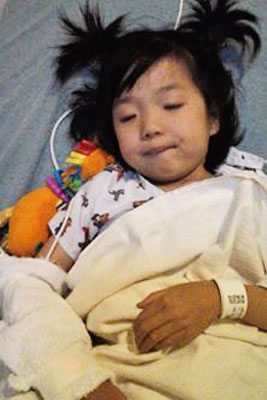
The seizures still continued every five to twenty minutes around the clock even after they’d tried two more additional medications. Then things got even worse when Sonnet presented with tachycardia (fast heart rate) and some respiratory distress. What followed was an entire day of test after test after test to determine if she had developed heart issues or an infection somewhere. (all tests eventually came back normal.)
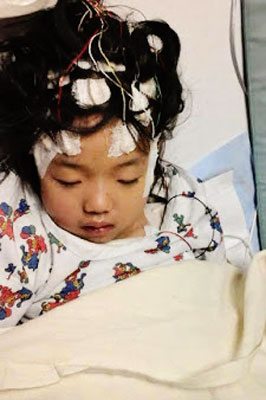
Two days of no food and drug induced sleepiness to the extreme, left us really concerned. Sonnet was put on “special watch” with constant video monitoring, and they started to talk about ICU in our conversations. The dietician wanted to start a feeding tube. At this point the mama bear in me came out.
Sonnet had done nothing but decline since being in their care, and they seemed unable to hear me when I argued that the medicines were just making her worse. The feeding tube would be a step back for this previously starving child who actually loves to eat. Of course she wasn’t eating when she was so drugged up!
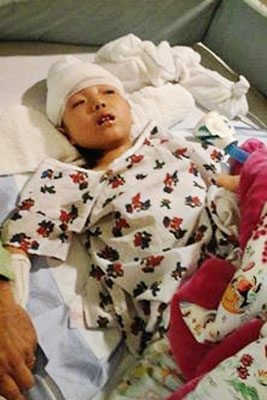
The next time the team rounded to our room I was ready.
(I’d brought the photo below up on my computer.)
I told them, “I didn’t go halfway around the world to bring Sonnet home just to die in an American hospital. She deserves better and we can do better. The bubbly child in this photo is who we are fighting for. This is who you need to get back.”
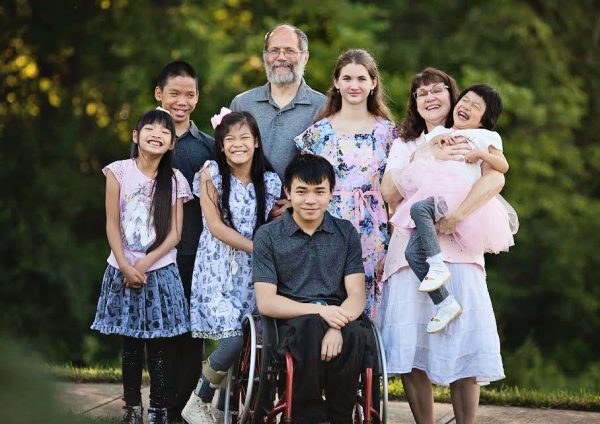
I don’t know if I heard audible gulps, or if it was just in my imagination, but things changed that day.
After refusing to let them give either of the two newest seizure medications again (these were the fourth and fifth different ones she had been given that did nothing for the seizures but gave more side effects) and begging them to find something better for her, they tried something different. They tried a medicine that isn’t largely prescribed for children… but it worked for Sonnet!
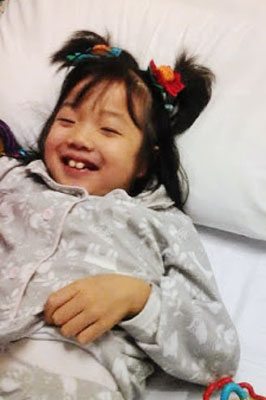
Then the rascal made the decision for the doctors the next morning and pulled out her own IV. The nurse wanted to replace it but agreed to wait for an hour until the doctors made their rounds. The dietician wanted it put back, but the doctors thought we ought to give her a chance to eat and drink on her own.
She was a champ. They issued the challenge and she conquered it!
On Wednesday the calorie count was only at 86. The dietician said she would have to eat an impossible (I thought) amount by lunchtime on Thursday to avoid the tube. But she did it! Her calorie count by then was nearly 1200! By this point Sonnet was back to herself. She was smiling and waving, and blowing kisses. Nurses actually began coming in our room just to see the transformation themselves!
As we were going through the discharge process, I thanked the doctors for working so hard to help Sonnet, and for putting up with me cause I knew it wasn’t easy at times. One of them replied that I was a “great advocate for Sonnet”. I told her that was a very polite way of putting it. She assured me that she was serious and not being facetious.
And that is what it comes down to as parents, isn’t it?
We simply do what needs to be done for our kids.
People tell me I’m so brave, but I’ll be honest. I’m not. I am somewhat of a coward really, and as human as anyone else. I don’t enjoy a medical crisis, and do enjoy my own bed. But the bottom line is that I love Sonnet fiercely and just do what has to be done to see that her life is as good as we can make it.
Sometimes with a medically needy child that means taking on the medical establishment to help them see that she isn’t “typical” and needs them to look outside the usual medicines. The typical ones didn’t work for her and she didn’t tolerate them either. True, the doctors have the education and at some point we do have to trust them and just go with it.
But no one knows your child as well as you do.
Yes, read any literature your physician makes available to you.
Yes, visit reputable websites and learn some more.
Yes, educate yourself on your child’s special needs.
Yes, educate yourself on all of their medications and the expected side effects.
But remember that no one loves your child as much as you do. Make the doctors see that this is a valuable life and you’re counting on them to come through.
It has now been three months since Sonnet has had a seizure. She has gained about fifteen pounds and is learning new skills quickly. See how much she has changed!
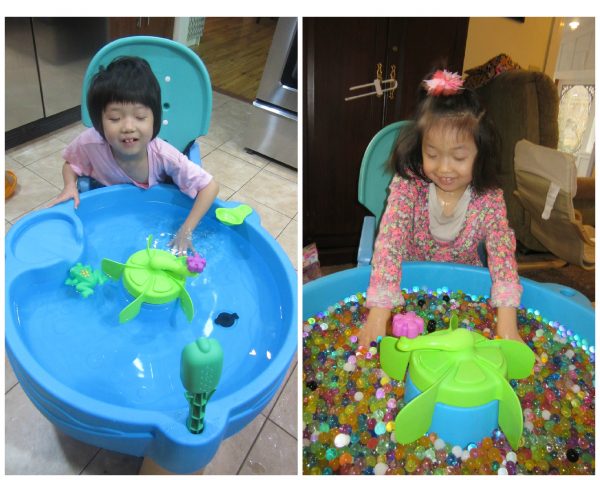
As I reflect back and see us as a family truly in crisis, I see where entire days just seemed to vanish as the doctors attempted to bring Sonnet back from (and I quote one of the neurologists) her “scary place”. I am tremendously grateful to family members, friends, and the medical staff who worked hard and tirelessly to bring our girl back to us.
What can others do to help in a time like this?
Many kindhearted people contacted me to ask, “Can I do anything for you?” and I appreciated that so much. But the funny thing is, when someone is truly in a crisis you can’t even think of what you need. Thankfully people jumped in and helped as their instincts told them. People helped in so many creative ways. It just what we needed!
I was a hot mess and am speaking truth when I tell you I simply wasn’t able to worry about my kids at home. My hours were consumed with getting Sonnet the help she needed, assisting or comforting during test after test after test, researching possible solutions on my own, and mundane things like figuring out what to eat to stay alive. Nope, not being dramatic.
So what were some of these things that were so helpful to us?
Two of my adult daughters and a neighbor jumped in. I didn’t need to be concerned about the five kids still at home. They were receiving loving care, and while not happy that I was gone, they weren’t the bundle of nerves I expected I might come home to. Some of them have considerable anxiety issues and this could have been so bad!
Friends jumped in to help those who were caring for the kids at home. Meals were delivered every night and continued through our first couple of days at home. I know it was such a relief to those caring for the other children to not have to worry about what to feed the mob at night.
A few days into our stay, Sonnet was in desperate need of a good bath. She had gone through two sessions of having leads glued into her hair and was just a stinky baby! I was shocked to find that the children’s hospital had nothing to offer for bathing someone with her needs. Our request for a bath chair resulted in a regular plastic chair with no supports or restraints.
Um… guys she usually can’t really sit up anyway, and is having seizures frequently!
I put out a call on Facebook for anyone local who could go to our house to pick up our Rifton Blue Wave chair so I could bathe her safely. Just moments later as I was making arrangements with a friend for the pick up, the adult daughter in charge at my house sent me a text that the chair had already been picked up by someone else. That fast. Two different people were ready to drop everything and make an hour round trip to drop the chair off for her! We used that chair a couple of times over the next few days and it made our stay so much more pleasant. What a huge blessing to have it brought to us, and so quickly.
While we weren’t allowed to have people up to our floor at the hospital, friends found creative ways to help. One out-of-state friend ordered a soft little doggy toy and balloons for Sonnet, and snacks for me from the gift shop and had them sent up. Once Sonnet was feeling better she spent hours playing with those balloons and is still snuggling with the stuffed dog at home.
Other friends sent up snacks, (who knew just figuring out what to eat was so hard?) and things like lip balm and lotions to make my creature comforts better. There was even ginger ball candy that was perfect for soothing my upset, nervous mama tummy. A couple of times when I was finding myself especially longing for a cup of good, strong coffee…one would -poof- appear via the concierge, having been dropped off by angels in the form of especially thoughtful friends.
Others sent notes of encouragement, posted their concern on my Facebook page, or sent text messages. It was so helpful to know that others genuinely care for Sonnet, and we weren’t in this alone.
And then there was the whole village of people who were praying for Sonnet.
From Facebook friends to other adoptive parents in the China groups, to in-real-life friends and their churches, to our pastors and the list goes on.
This was perhaps the biggest blessing to know people were praying.
I sincerely believe we witnessed a miracle that week. We had a desperately sick little girl on that Wednesday, and on Thursday she was on her way back to us.
What can you do yourself to prepare for a hospital stay?
I wasn’t sure that Sonnet would be admitted the day I took her to the emergency department, but suspected it could happen. What things did I deem necessary to take just in case?
I quickly packed a backpack with a couple of clothing changes for the both of us, some snacks, a one cup coffee maker (and noodle cups to go along with it too), and my computer and tablet with their chargers.
I left the backpack in the van, but it was there and ready to quickly go into the back of the ambulance with us when we were transferred.
Helpful hint: If you have a medically needy child, keep a stash of portable foods that can be packed quickly.
You likely won’t have the time or brain cells to think through what to grab. The clothes and snacks are obvious. I do most of my reading on a Kindle app on my tablet so it had to go. The computer was my primary way of communicating needs to friends. It was also super handy to provide children’s music (Sonnet has never been a fan of television but loves music) and some white noise for me when attempting to sleep at night.
The computer was invaluable for researching treatments, medications, and tests that were being run. But the biggest surprise use was having a nice, large photo of Sonnet handy to show them WHO they were really working for. She didn’t resemble herself at all during most of that week, and I truly think the turning point was when they glimpsed the real Sonnet.
All my words – describing how full of life she was before this happened – didn’t affect things as much as that one picture.
– guest post by Randi, mama to thirteen children, ages seven through thirty-five, and grandma to twelve, ages newborn through thirteen

























I loved reading all the beautiful ways that you advocated for Sonnet! You had many great ideas. I do think having a photo of your child on the front door or another area is so important. When they are in pain and hooked up to wires, I think they are a generic patient to many. When the staff sees a smiling face of a child taken before hospitalization, they seem to connect in a special way. God Bless your family!
This sounds so much like what we’ve been through just this week. After 3 days in the hospital, we left with a new seizure drug. I wish I’d had my laptop with me to research it there. This new drug is known to cause cognitive impairment, and it certainly seems to be the case with our girl. I wish I had known enough to question it before we were discharged. I also wish I’d had a photo of our little girl sitting on her own, smiling and looking alert – which is so different than what the doctors saw in the hospital and from how she appears on this new drug.